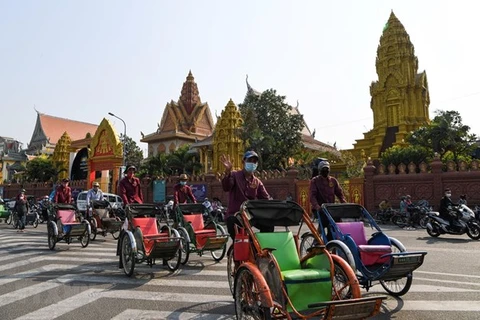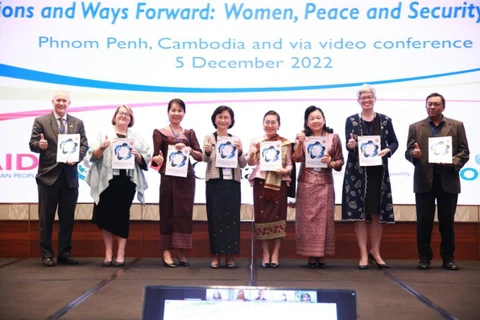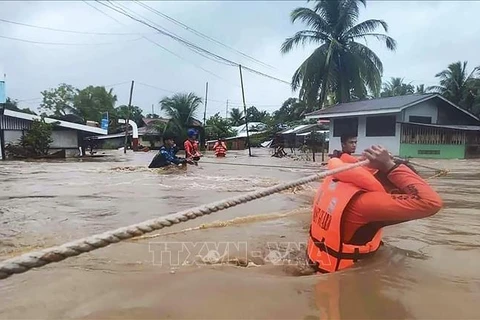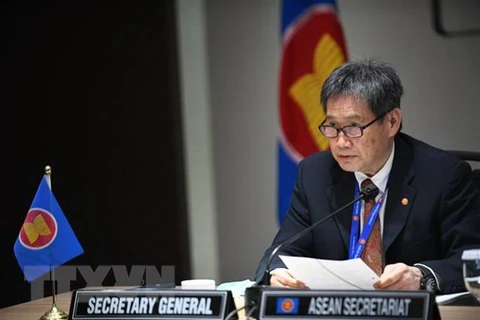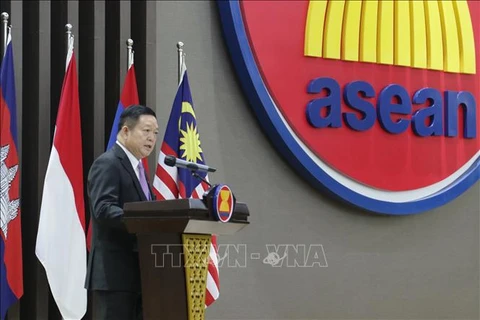Jakarta (VNA) - The next page in ASEAN’s story will be shaped by new and emerging trends that present both challenges as well as opportunities, said Secretary-General Dr. Kao Kim Hourn.
Making his remarks at a January 9 ceremony to officially take office as head of the ASEAN Secretariat, the official assessed that as a region very much prone to natural disasters and vulnerable to climate change, the bloc must hasten its drive towards sustainable development and accelerate its collective efforts for transition to a carbon neutral economy.
It is also necessary to prepare to deal with any potential or eventual natural calamities, he added.
“We should likewise strongly pivot towards the development of an ASEAN Digital Economy to leverage the region’s 440 million internet users and facilitate new trade and investment opportunities, create more jobs, as well as enhance innovation and productivity, whilst also addressing the growing cybersecurity threats and other technology-related challenges,” he recommended.
According to the new Secretary-General, the region’s preparedness for a digital and sustainable future, together with the implementation of the ASEAN Comprehensive Recovery Framework (ACRF) and the entry into force of the Regional Comprehensive Economic Partnership (RCEP), will be crucial for the bloc to remain competitive and open in the global landscape and will propel its growth, with sustainability and resilience, in the coming years.
“A future-ready ASEAN undoubtedly should also be crafted and directly involved by all of our stakeholders, particularly the youths. This important demographic will play a critical role in strengthening ASEAN’s resilience to respond to future health emergencies, disasters, impacts from climate change, as well as other emerging trends and challenges,” he went on.
In conclusion, he affirmed that ASEAN has always been at its very best when it works together collectively in the spirit of unity and solidarity, whether that be among member states or with external partners./.
Making his remarks at a January 9 ceremony to officially take office as head of the ASEAN Secretariat, the official assessed that as a region very much prone to natural disasters and vulnerable to climate change, the bloc must hasten its drive towards sustainable development and accelerate its collective efforts for transition to a carbon neutral economy.
It is also necessary to prepare to deal with any potential or eventual natural calamities, he added.
“We should likewise strongly pivot towards the development of an ASEAN Digital Economy to leverage the region’s 440 million internet users and facilitate new trade and investment opportunities, create more jobs, as well as enhance innovation and productivity, whilst also addressing the growing cybersecurity threats and other technology-related challenges,” he recommended.
According to the new Secretary-General, the region’s preparedness for a digital and sustainable future, together with the implementation of the ASEAN Comprehensive Recovery Framework (ACRF) and the entry into force of the Regional Comprehensive Economic Partnership (RCEP), will be crucial for the bloc to remain competitive and open in the global landscape and will propel its growth, with sustainability and resilience, in the coming years.
“A future-ready ASEAN undoubtedly should also be crafted and directly involved by all of our stakeholders, particularly the youths. This important demographic will play a critical role in strengthening ASEAN’s resilience to respond to future health emergencies, disasters, impacts from climate change, as well as other emerging trends and challenges,” he went on.
In conclusion, he affirmed that ASEAN has always been at its very best when it works together collectively in the spirit of unity and solidarity, whether that be among member states or with external partners./.
VNA

